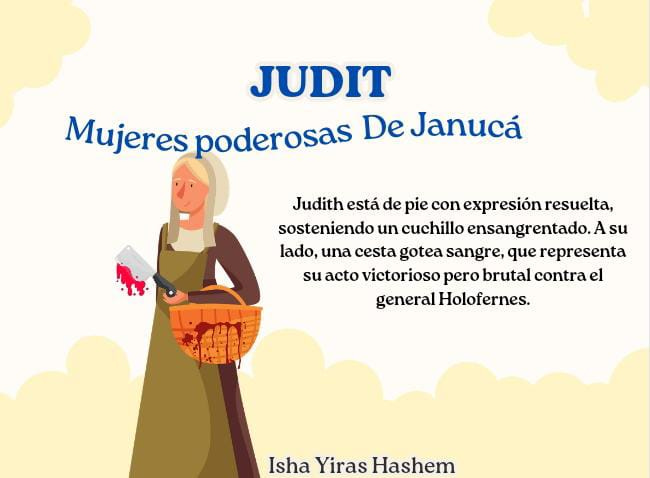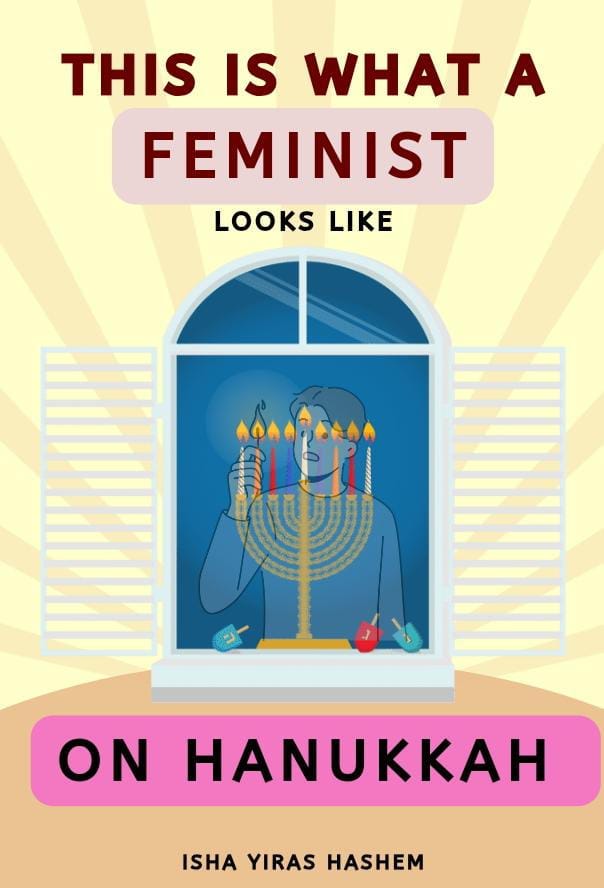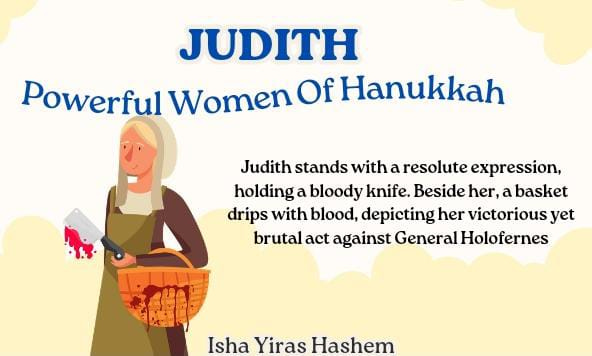1/8: Boris The Terrible Infiltrates Ohr Somayach and learns about Hanukkah
Day 2/8: Boris Is Inspired By the Greeks And Fixes The Dreidels
Day 3/8: The Latke-tostraphe Of Intermittent Fasting
Day 4/8: Boris Hellenizes The Chocolate Coins
Day 5/8: Boris Tries To Be A Feminist
Día 5/8: Boris intenta ser feminista
Como siempre, gracias Debbie Rubinstein por la ayuda con la traducción al español; todos los demás errores son sólo míos. ¡Disfruta! Día 1/8: Boris El Terrible celebra Janucá y se infiltra en Ohr Somayach Día 2/8: Boris se inspira en los griegos y arregla los Dreidels
One year, Boris tried to stir feminist dissent against Hanukkah. He assumed Jewish women, burdened with holiday preparations, would readily embrace his divisive cause. But he had underestimated the depth of their knowledge of, and devotion to, their religion.
To his surprise, every woman he approached told him this was ridiculous. They quoted the Talmud, Tractate Shabbat 23b, where it says explicitly that women were part of the miracle of Hanukkah.1
R. Yehoshua ben Levi said: Women are obligated concerning lighting Hanukkah candles, since they, too, were part of the miracle.
Additionally, some of the most powerful elements of Hanukkah came about through women.
1. Judith
For instance, eating dairy foods during the festival is a tradition linked to a woman named Judith.23
Image: Judith leaving with the head of Helifornos.
Judith, a woman of remarkable courage, went to see the attacking general, Helifornos. She explained that she had a secret message for the general, and must meet him in private.4
The general was charmed by her, and wanted her to join him for a meal. She refused to eat his food, because it was not kosher, which may remind you of Daniel and his three friends in Nebuchadnezzar’s palace.5 Of course, Yehudis couldn't tell him this, because he was intent on fighting her religion. Instead, she offered him her own cheese and wine, which she had brought to him in her basket, and which she explained that she had made herself. She would like Helifornos to taste it.
Judith hoped the salty cheese would make Helifornos thirsty, and that he would consequently drink wine to quench his thirst. Her plan worked. He ate the cheese and drank the wine. Once inebriated, Helifornos fell into a deep slumber.
Judith pulled his sword out of its sheath and used it to cut off his head. She put the decapitated head in the basket, which had held the cheese and wine. Then she left, as if nothing had happened, whispering to the guards that they shouldn't bother Helifornos while he is sleeping.6 After safely returning to her people, Judith revealed her triumph by having the leaders display Helifornos' head on the city walls. This shocking sight caused his soldiers to flee in terror.
2. Channah and her seven sons:
There is another, tragic and compelling story related to Hanukkah. It is known as the story of Channah and her seven sons.
Channah and her sons were arrested by King Antiochus, who demanded that they renounce their faith and bow to an idol. Channah actually encouraged her sons to allow themselves to be killed rather than worship the idol. 7
One by one, each son refused, showing steadfast devotion to their beliefs, even in the face of death. She then collapsed and died.
Rebbetzin Fastag comments:
I read that the mother, whose real name is not specified, as Chazal simply call her 'a woman', is believed by many to be the reincarnation of Abraham's mother.
When Nimrod decreed that Abraham would be thrown in the furnace for opposing idol worship, she attempted to persuade him to yield to Nimrod to spare his life. This inadvertently intensified the challenges he faced. This act necessitated a form of rectification, which she achieved by doing the exact opposite in her later life as Channah. In this role, she demonstrated immense strength by encouraging her sons to remain steadfast in their faith, even in the face of death.
Boris was left speechless after hearing about these powerful women. Boris was extremely annoyed by the women's knowledge and pride in their heritage. He would have to try something else.
(For the elevation of the soul of Nechama bas Yechiel)
🕎🕎🕎🕎🕎
https://ohr.edu/explore_judaism/daf_yomi/the_weekly_daf/246 by Rabbi Mendel Weinbach
Rashbam's approach is that the women were the catalysts for these miracles - Esther for Purim, Yehudis for Chanukah and the righteous women of Israel for the miracle of the Exodus from Egypt. Tosafos takes a different line and stresses the fact that women were as exposed to danger from the enemy decrees as were the men, and must therefore equally celebrate the miracle which redeemed them.
https://etzion.org.il/en/holidays/chanuka/they-too-were-part-miracle
Article by Rabbi Yaakov Medan, translated by Kaeren Fish. Thanks to Devorah Berkovitz for permission to quote.
Rashi (ad loc.) understands this to mean not only that the women were redeemed along with the men, but that they were actively involved in the miracle; they played a role in bringing it about:
For the Greeks decreed that every maiden to be married would lie first with the [Greek] officer, and the miracle was performed by a woman.
How was the miracle of Chanuka "performed by a woman"? The Tosafot (Pesachim 108b) provide more detail, explaining that the miracle was performed "by Yehudit." The story of Yehudit is recounted by the Kolbo:
Women are obligated concerning Chanuka candles since they too were part of the miracle – meaning, the enemies came to annihilate everyone, men, women, and children.
And there are some who explain that it was through a woman, named Yehudit, that this great miracle occurred for them. As recounted in the aggada: Yochanan, the Kohen Gadol, had a daughter who was extremely beautiful, and the Greek king ordered that she should lie with him. And she fed him a cheese dish so that he would become thirsty and drink much and become inebriated, and he lay down and fell asleep. And while he lay asleep, she took his sword and cut off his head and brought it to Jerusalem. And when the army saw that their leader was dead, they fled. And therefore there is a custom to prepare cheese dishes on Chanuka. (Kolbo, siman 44)
In light of the Kolbo, the Rema rules:
Some say that one should eat cheese on Chanuka, since the miracle came about through the milk which Yehudit fed to the enemy. (Rema, Orach Chayim 670:2)
Yeshivat Har Etzion's Torat Har Etzion/Virtual Beit Midrash website
There is a book of Judith in apocrypha, but it is not reliable and contains obvious mistakes.
Via Ohr Somayach:
These books and others like them are part of what is known as the Apocrypha. The Apocrypha are not considered holy, inspired or prophetically written. Therefore, they are not necessarily historically accurate. The Book of Maccabees describes events already discussed in the Talmud and hence is generally considered more accurate than the other books of the apocrypha. Another account is the Scroll of Antiochus, which is printed in the Siddur Otzar Hatefillot. Some communities used to read the Scroll of Antiochus during Chanukah on Shabbat afternoon.
https://ohr.edu/ask_db/ask_main.php/173/Q4/
Ohr Somayach Institutions www.ohr.edu
Judges 3:19; this is similar to Ehud Ben Gera who told King Eglon he had a secret message to tell him. Once alone, he killed him. The “secret message” is death.
https://ishayirashashem.substack.com/p/food-for-thought
Food For Thought
Leer en Español To read this in Arabic, click here. Characters: Nebuchadnezzar, king of Babylon Ashpenaz (Chief Officer) Steward Daniel / Belteshazzar Hananiah / Shadrach Mishael / Meishach Azariah / Abed-nego Other young men (Scene: a victorious Nebuchadnezzar is proudly preparing to leave Jerusalem, G-d having delivered Jehoiakim, the king of Judah, and so…
Also done by Ehud Ben Gera. https://www.thetorah.com/article/judith-a-chanukah-heroine
https://www.chabad.org/holidays/chanukah/article_cdo/aid/429014/jewish/Chanah-and-Her-Seven-Sons.htm







I think people hear all the complaints about patriarchal societies and get on the bandwagon to assume and denounce all societies as anti women. However, Judaism has always revered women.